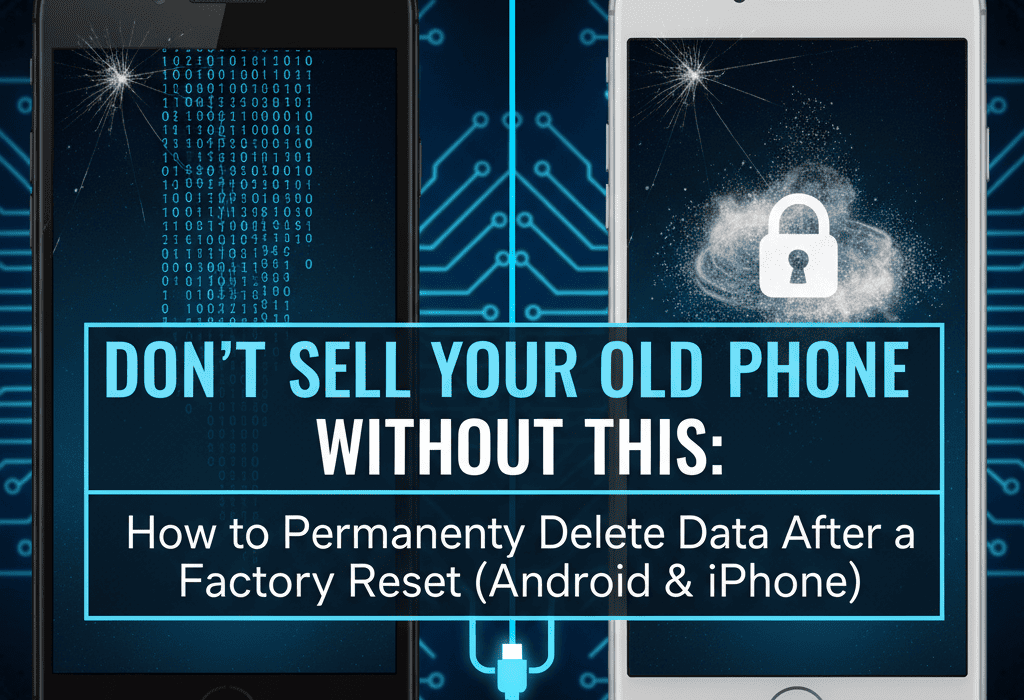Introduction
Before trading in or handing over an old phone, relying only on a quick factory reset can leave traces of personal data if the sanitization process is incomplete or misapplied, so this guide uses official Apple workflows and NIST media‑sanitization principles to make residual data practically unrecoverable.
It is written to be genuinely people‑first by explaining what works, why it works, and how to apply it on Android and iPhone, while avoiding thin paraphrases of the source video and grounding every step in reliable documentation.
Table of Contents

Why it fails
A factory reset often changes how storage maps to files so content no longer appears in the interface, but poorly executed resets can still leave recoverable remnants for forensic tools, which is why standards recommend methods that invalidate or overwrite sensitive data.
Using cryptographic key removal where supported, and targeted overwrite where needed, sharply reduces the chance that any old files can be reconstructed after transfer or resale.
Encryption facts
Modern Android and iOS devices encrypt data at rest by default, and a correct factory reset deletes the encryption keys so earlier data is unreadable without those keys.
Even when the reset is properly done, activation and account locks must be cleared, and removable media must be sanitized separately because those elements are not resolved by the handset’s reset alone.
Android steps
First back up what matters and remove the Google account in Settings so Factory Reset Protection does not block the next owner during setup, which is a common post‑sale failure.
After removing accounts, run Settings > System > Reset options > Erase all data (factory reset) so the phone performs a proper key‑wipe on supported devices, which addresses data‑at‑rest under normal circumstances.
If the phone uses an SD card, sanitize it separately by formatting via Settings or a full format on a computer because the handset reset does not erase removable storage.
Legacy devices
On older or unencrypted devices, add a supplemental overwrite pass with non‑sensitive filler files before the final reset so any attempted recovery surfaces meaningless data instead of personal content.
This mirrors the video’s practical advice and aligns with the spirit of NIST “clear” guidance for higher‑risk or legacy scenarios where encryption‑based key‑wipe may not be sufficient on its own.
iPhone steps
Start by signing out of the Apple ID and turning off Find My to remove Activation Lock so the next owner can activate the device without prior credentials.
Then go to Settings > General > Transfer or Reset > Erase All Content and Settings, and when prompted, remove the eSIM so the device is ready for a clean carrier setup.
No device in hand
If the device is already with someone else, use iCloud.com/find to erase it remotely and then remove it from the account so Activation Lock does not prevent setup for the new owner.
This remote path protects privacy and completes the ownership transfer cleanly when physical access is no longer possible.

Removable media
Phone resets do not sanitize external media like SD cards, pen drives, or external disks, so these should be formatted or securely overwritten separately to minimize residual data risk.
In contemporary media, a single well‑executed pass is generally adequate for practical purposes, while high‑risk situations can escalate to purge or destroy per organizational policy.
Verification
Where the risk profile is higher or compliance applies, document the sanitization method and, if needed, confirm that recovery tools do not reveal personal data, consistent with the verification mindset in NIST guidance.
If policy requires, move beyond “clear” to “purge” or “destroy” with appropriate logs to satisfy audit or regulatory needs.
Mistakes to avoid
Do not ship an Android phone with the Google account still attached because FRP can lock the buyer out and complicate activation.
Do not hand over an iPhone with Find My enabled or still tied to an Apple ID because Activation Lock will block setup even after a wipe.
FAQ
Is a factory reset enough on modern phones?
On devices that encrypt data by default, a correct reset removes the encryption keys so past data is unreadable, but FRP/Activation Lock and removable media still need separate handling.
What is FRP and why remove my Google account?
Factory Reset Protection ties setup to the last Google account; removing the account prevents activation blocks for the next owner.
How do I ensure an iPhone isn’t activation‑locked?
Sign out of the Apple ID, turn off Find My, erase the phone, or use iCloud.com/find to erase and then remove the device from the account if it’s not in hand.
Do I need to overwrite with junk files?
On encrypted devices, key‑wipe is typically sufficient, but overwrite is a pragmatic supplement for legacy or unencrypted phones and for removable media.
How should I handle SD cards and eSIMs?
Format SD cards separately because phone resets don’t sanitize them, and remove the eSIM during iPhone erase to avoid provisioning conflicts.
Attribution
This guide builds on “Don’t Sell Old Phone Without This Setting | Permanently Delete Data From Phone,” expanding it with official Apple workflows and NIST SP 800‑88 best practices for safe, standards‑based erasure.
Also Read: Apple iPhone 17 Pro Max Launch: Date, India Price, Specs, Pre‑Order, Availability.





